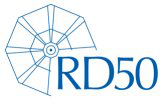Speaker
Description
The proton irradiation site at Bonn University has been introduced at previous RD50 workshops. Recently, the setup has been upgraded to minimize fluence fluctuations on the DUT and enable flexible irradiation procedures. The Bonn Isochronous Cyclotron delivers 14 MeV (~12.5 MeV on-device) protons with typical beam currents of 1 𝜇A and beam diameters of a few millimeters to the setup. Enhanced beam diagnostics as well as R/O electronics allow for online monitoring across several orders of magnitude of beam currents with a relative uncertainty of approx. 1%.
Devices are irradiated by being scanned through the beam in a row-wise pattern while housed in a thermally-insulated cooling box at approx. -20 °C to minimize annealing. Online monitoring of the beam current at extraction allows to measure the fluence per scanned row, ensuring homogeneous irradiation, with an accuracy of a few %. The setup allows to power and readout DUTs during irradiation as well as pause irradiations for in-between measurements. Latest irradiations of thin LFoundry test structures yield a proton hardness factor with reduced uncertainty, compatible with previous measurements and simulation, enabling to irradiate up to 10$^{16}$ n$_{eq}$/cm² within a few hours. The setup, its reworked components, the irradiation procedure as well as the latest proton hardness factor measurements are presented in this talk.
